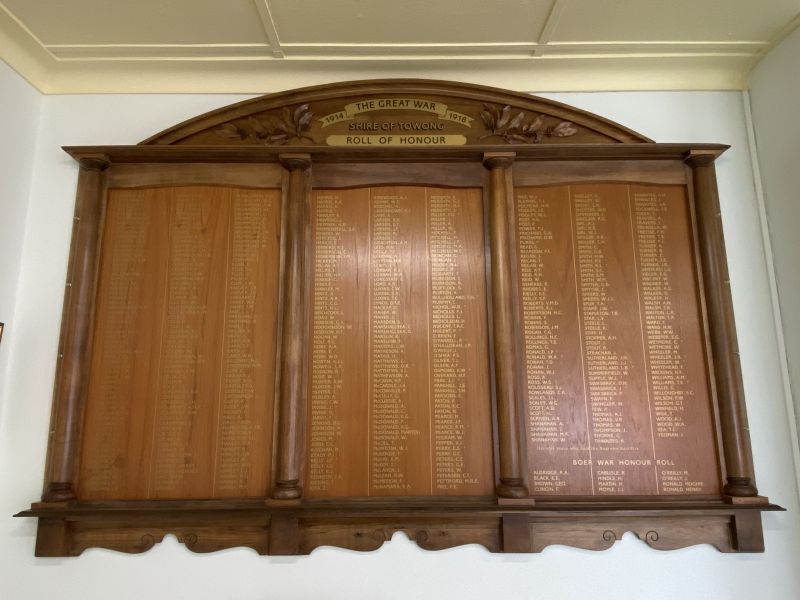William (Bill) Shanahan
Bill was born in Tallangatta in 1891, the seventh child of Timothy “Barney” and Ellen (née Mongan) Shanahan. He would eventually have nine other siblings, although four would die young, and an older brother, Anthony, would also die in the war in 1916. During his younger years he attended the Noorongong State School No. 3073.
Bill was a 29 year-old, single, farm hand when he enlisted on the 3rd of August 1915 at Melbourne. He stated that he had prior military experience, having been a member of a field battery for three months. Bill was allotted the Regimental Number 3242 and placed in the 7th Reinforcements for the 22nd Infantry Battalion.
He undertook his initial training with A Company ofthe 1st Depot Battalion at Seymour in central Victoria. He embarked from Melbourne on board HMAT A73 Commonwealth on the 26th of November, 1915. Upon arriving in Egypt he was sent to the 6th Training Battalion, where he experienced further training before being allotted to the 7th Battalion at Serapeum, Egypt, on the 24th of February, 1915. At this stage he reverted form his rank of acting Corporal to Private.
He suffered a mild case of mumps which resulted in him being admitted to the 4th Auxiliary Hospital in Cairo. Bill was dsicharged after four days. His final transfer was to the 57th Battalion on the 20th of April, 1916. The 57th was raised in Egypt two months prior to Bill joining it. Itwasformed as part of the AIF’s doubling program, where half of an existing battalion was sent to form a new, or pup battalion, whilst the other half remained with the original battalion. The 57th became part of the 15th Brigade on the 5th Australian Division.
Bill spent another four days in hospital at Moascar suffering from a mild ear infection. Three days after being discharged Bill, along with other sections of the 15th Brigade, embarked on the troopship Kalyan at Alexandria on the 17th of June. One week later, they disembarked at Marseilles in southern France. A train ride across France in early summer would have been a contrast to the Australian soldiers who had been training in Egypt.
Bill would have his first taste of action on the Western front on the 19th of July, when the 57th Battalion was used as a support battalion for the attack at Fromelles. The battalion suffered relatively light casualties compared to its sister battalions. It was then up to the battalion to hold the line in the following days. The 5th Division continued to man the front in the Fromelles sector for a further two months. During this time Bill was promoted to the rank of Corporal.
The European winter of 1916-1917 was one of the coldest on record. It was aneight week period of continuous rain, sleet and snow. Abnormally low temperatures, especially at night, froze clothes, blankets and sometimes, men. The conditions resulted in many soldiers becoming ill or suffering from conditions such as trench foot. While in the trenches the soldiers often constantly stood in cold water or muddy slush. Unable to take off their boots at night for fear of their feet swelling, men would find that their feet became damaged due to the moisture. On the 3rd of November, Bill was sent to the 36th Casualty Clearing Station suffering from trench foot. He was sent by the 1st Ambulance Train to the 9th General Hospital at Rouen, France. On the 7th he embarked for England on the Lanfranc. Bill was admitted to the Duchess of Cornwell Red Cross Hospital at Aldershot, where he remained for five weeks. He then spent four days at the 3rd Auxilary Hospital at Dartford before being discharged and given two weeks leave.
In early January of the new year, Bill reported back to No. 1 Command Depot at Perham Downs in Wiltshire where he was classified as B1A (fit for Garrison service aboard). Over the next seven months Bill would be suffled around various Depot Battalions. On the 13th of July 1917, over eight months since he was taken to the casualty clearing station, Bill rejoined his battalion in France.
On the 1st of February, 1918, Bill was promoted to Sergeant. He spent from the 19th of February to the 3rd of March at the Brigade School, learning how to be a non-comissioned officer.
In late March of 1918, German forces launched a major offensive on the Western Front. With Russia no longer in the war, the Germans were able to use nearly fifty divisions that up until then had been used on the Eastern Front. The 5th Australian Division was moved to the sector around the town of Corbie. On the 25th of April, the 57th Battalion participated in a major counter-attack at Villers-Bretonneux. Bill was wounded in action on the following day, suffering from gunshot wounds to his back, abdomen and hip. He was taken to the 14th Field Ambulance and then transferred to the 4th Casualty Clearing Station where he succumbed to his wounds on the 27th of April.
Bill was buried in the Pernois British Cemetery in Halloy-les-Pernois, France. He is also remembered at the Australian War Memorial Roll of Honour, and the Boer War and WW1 Roll of Honour at Tallangatta, Victoria. For his service he was awarded the British War Medal and the Victory Medal.
 Stephen Learmonth
Stephen Learmonth